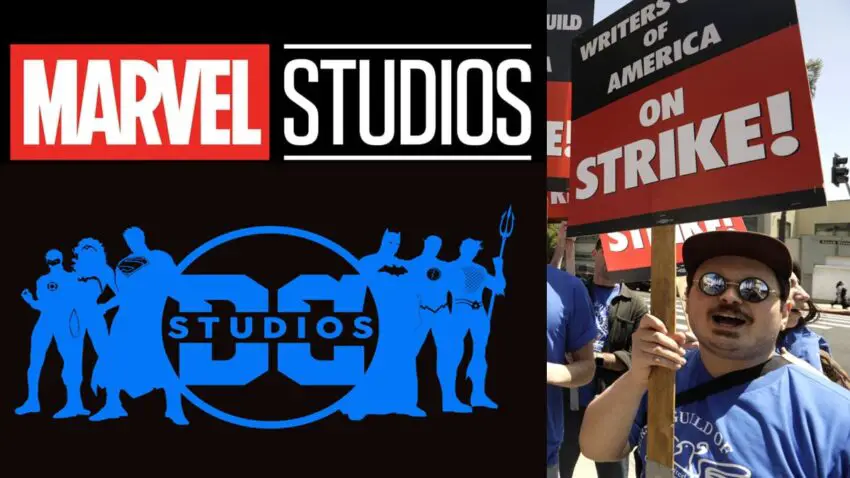If you’re not up to speed on the ins and outs of Hollywood, the WGA voted this week to go on strike. That means people who write and are members of the Writers Guild of America will no longer work on any scripted (or some unscripted) productions in which the WGA has a collective bargaining agreement with a studio.
Translation: A WGA strike means no TV or movie scripts will be written by Guild members.

Why am I talking about the WGA strike on a Comics website? The strike has no direct effect on comics production, but as we saw during the last strike in 2008, several WGA writers decided to take up comic writing to make ends meet, AND comics-inspired shows (Marvel, DC, etc.) risk getting delayed.
How well did those 2008 WGA transplants into comics work out? Ermm, that’s a topic for another day.
I won’t talk about all the details of the WGA demands (click here to read the list for yourself), but it’s worth noting what WGA demands make sense and which ones are a tough sell.
The “Good” Demands
More Money
Across the board, writers are asking for more money. I’m a writer, so I have a hard time arguing against people who come up with the dreams and ideas we see on the big (or small) screen not getting a cut of the profits. If you bring value, you should get paid for that value, and if you believe the numbers, it looks like the per-page rates have dropped in recent years when everything is more expensive.
Writers should get paid for the value they bring, and that payment should match the rising cost of living. That’s fair.
Residuals aka Royalties
Yep, clarity and updates to residuals make sense in a modern economy. If a writer turns in a killer script that the studios and networks can make money from over and over, the writer deserves a cut of that profit.
Not every writer earns a fair percentage on residuals, and some earn no residuals at all. It’s incumbent on the studios to ensure a lifetime’s worth of entertainment matches an appropriate amount of compensation for the writer who created it.
Streaming Transparency and Compensation
Yep, again. Come on, man. The studios know what kinds of viewer numbers they’re pulling on streaming services. Hiding those numbers as an excuse to not include streaming as part of the WGA contracts is Sleezy with a capital ‘S’.
Studios should be transparent about the successes and failures of streaming shows and offer the same compensation to writers as with any other television show. The studio claims of “streaming is different”, “streaming wasn’t part of the contract”, or “we haven’t figured out how to measure the foreign markets” is mostly a bunch of baloney.
The “Questionable” Demands
This section is going to ruffle a few writers’ feathers, but if we’re going to be fair, we have to be fair on both sides of the line.
Guaranteed Staffing Duration
Writing, particularly entertainment writing, has never been a sure thing. Sometimes shows get canceled. Sometimes movies fall into Development Hell. Things happen. Calling for time guarantees on a writing gig is a tough sell in an industry where change is the only constant and not every writer does a good enough job to remain on a project.
Let’s be honest. If stability and reliability are a chief concern, writing is not the best profession to go into.
Minimum Hiring Quotas for Writers’ Rooms
Again, not every project or budget is the same, and change is the only constant. Putting blanket minimums on the number of people in a writers’ room runs against the fluidity of a project’s size and scale.
There are times when two or three writers are enough. I’m still floored by examples of hit television shows (e.g. Sam Esmail on Mr. Robot) wherein entire seasons are written by one person. Does that happen a lot? No. Should it happen a lot? That’s up to the creators to decide, but forcing a flat headcount is not smart nor realistic. Headcount should be addressed on a case-by-case basis.
For the naysayers who believe more writers in a room is better, think about how the Disney+ She-Hulk show turned out (👎) when compared to the number of writers on staff (picture below).
More writers ≠ better writing.

Artificial Intelligence aka the “Big One”
Alrighty, I’ve touched on this topic before, but from the artist’s POV (see Comic Artists are wrong about AI Art). Now, it’s the writers’ turn, and the case for demands is a lot weaker for writers than artists.
I’ll say it loud and clear just so there’s no misunderstanding.
A.I. is here, it’s not going away, and people will lose their jobs over it.
Should there be controls in place to ensure A.I. isn’t used unethically (e.g. plagiarism)? 100% yes. It’s a tool like any other and subject to abuse like any other. A.I. needs to be controlled to prevent unethical and illegal usage.
But if the WGA goal is to control A.I. to prevent people from losing their jobs, that ship has already sailed. I’m sorry, but you can’t put the genie back in the bottle. Lower-tier writers who don’t bring something special to the table are not long for this industry.
ChatGPT is the latest A.I. craze, and it meets all the criteria for massive industry disruption. It’s fast. It’s cheap. And it has the potential to be good. Is A.I. output good enough to be indistinguishable from a human writer? In creative writing, no, but that goal is getting closer every day. When the day comes when you can’t tell the difference between an A.I. script and a human-written script, it’s going to be game over for a lot of mediocre writers.
Look, I don’t want to see good people put out of work, but when a machine reaches the point where it can do the same job just as well but cheaper and faster, the argument becomes moot.
How should the WGA address A.I.? Put in the controls to prevent unethical/illegal behavior, insist on copyright protections where it makes sense, and then…
Well, I don’t know what exactly the WGA should do about A.I. I do know that in the past, disruptive technologies have always given rise to new careers. Horse & Buggy makers became car assembly workers. Camera makers (the ones who stayed in business) worked with smartphone producers to incorporate better camera technology. Typewriter manufacturers learned how to make computer keyboards.
The adoption of A.I. will invariably lead to the emergence of new but different jobs, so if you’re a writer threatened by A.I., keep an open mind and get ready to seize the opportunity when it arises.
And if you think resisting a disruptive technology like A.I. is a battle that can be won, ask Kodak how its resistance to digital photography turned out (Spoiler: not good).
What do you think about the WGA’s strike and the list of demands? Leave a comment below to have your voice heard.
We hope you found this article interesting. Come back for more reviews, previews, and opinions on comics, and don’t forget to follow us on social media:
If you’re interested in this creator’s works, remember to let your Local Comic Shop know to find more of their work for you. They would appreciate the call, and so would we.
Click here to find your Local Comic Shop: www.ComicShopLocator.com
As an Amazon Associate, we earn revenue from qualifying purchases to help fund this site. Links to Blu-Rays, DVDs, Books, Movies, and more contained in this article are affiliate links. Please consider purchasing if you find something interesting, and thank you for your support.

